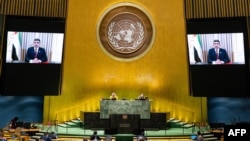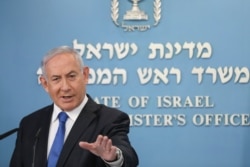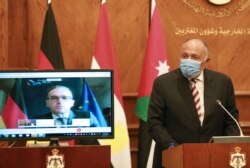Israel and the United Arab Emirates hailed their new peace agreement Tuesday during remarks at the final day of the U.N. General Assembly, saying it would increase the chances of resolving the Israeli-Palestinian conflict.
"With the signing of a historic peace accord with Israel, supported by American efforts, my country was able to freeze the annexation decision and opened broad prospects to achieve a comprehensive peace in the region," said UAE Foreign Minister Abdullah bin Zayed Al Nahyan in a pre-recorded statement. "We hope that this peace accord will provide the opportunity for the Palestinians and the Israelis to re-engage in negotiations to achieve peace."
Al Nahyan reiterated his government's commitment to a two-state solution for the decades-old conflict.
Israeli Prime Minister Benjamin Netanyahu accused the Palestinian leadership of effectively wielding "a veto on peace" for years between his nation and other Arab countries with what he characterized as "unrealistic" demands, including that Israel withdraw to pre-1967 borders or that descendants of Palestinian refugees be allowed to settle in Israel.
"Of course, these demands, along with many others, are complete non-starters for any responsible Israeli government," Netanyahu said in his pre-taped address. "Yet for years, many in the international community have tried to appease these absurd Palestinian demands, and as a result, they have wasted time to try to advance an illusion that won't happen, instead of working for a realistic solution that could happen."
He praised U.S. President Donald Trump for choosing "a path anchored in reality" and said now that two Arab states — the UAE and Bahrain — have made peace with Israel, others will follow.
The Abraham Accords, as the peace deals are known, were signed in a ceremony on Sept. 15 at the White House.
"The expanding circle of peace will not make an agreement between Israel and the Palestinians less likely," Netanyahu said. "It will make peace between Israelis and Palestinians more likely."
In a tweet on Sept. 14, Palestinian Prime Minister Mohammad Shtayyeh condemned the Abraham Accords, calling the signing ceremony "a black day in the history of Arab nations."
Netanyahu said when the Palestinians are ready, he will be ready to negotiate based on the peace plan put forth earlier this year by the Trump administration.
The Palestinians have rejected that deal, which they see as heavily favored toward Israel and not giving them a sovereign, contiguous state with East Jerusalem as its capital.
Israel and the UAE also share a common adversary — Iran.
"Both Arabs and Israelis are together urging tough action on Iran," Netanyahu said. "And when Arabs and Israelis agree, others should pay attention."
The UAE foreign minister called on Tehran to abide by U.N. Security Council resolutions banning its development of ballistic missiles and arming of terrorist groups. He said the 2015 nuclear deal had failed to rein in Iran, and he hoped a new comprehensive agreement could be achieved with the input of key regional states that addresses their concerns.
German Foreign Minister Heiko Maas welcomed the recent developments between Israel, the UAE and Bahrain as "grounds for hope" for the Arab-Israeli conflict, urging that the new dynamic should "be seized by the parties for fresh, credible negotiations on a two-state solution that alone holds the promise of lasting peace."
This year's annual gathering of world leaders was held online due to the coronavirus pandemic, which has killed more than 1 million people worldwide, according to the Johns Hopkins University Coronavirus Resource Center.







